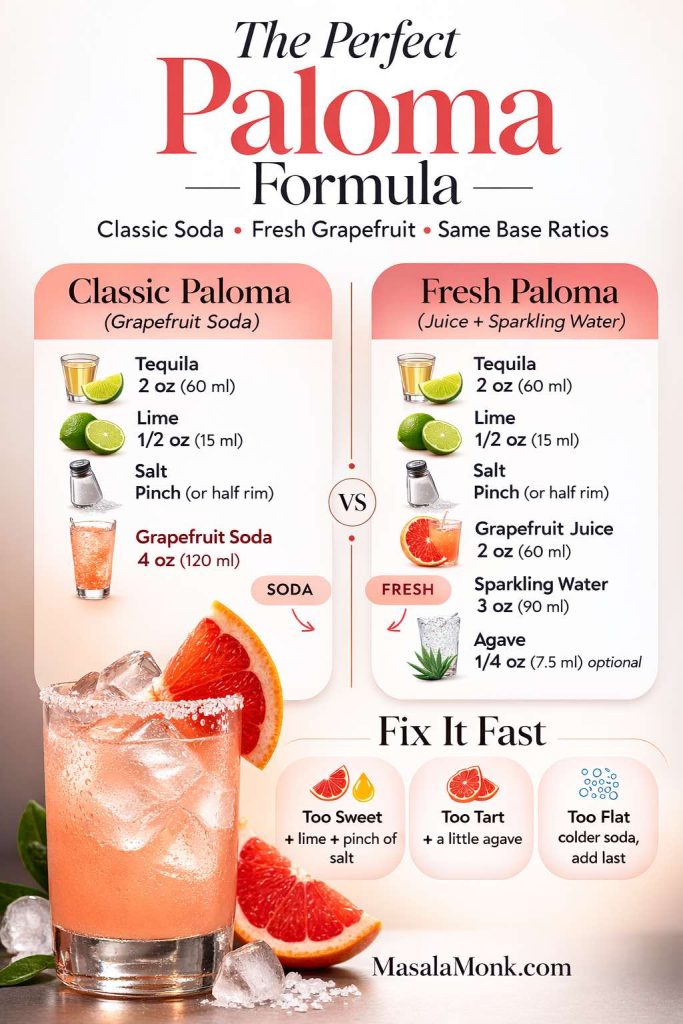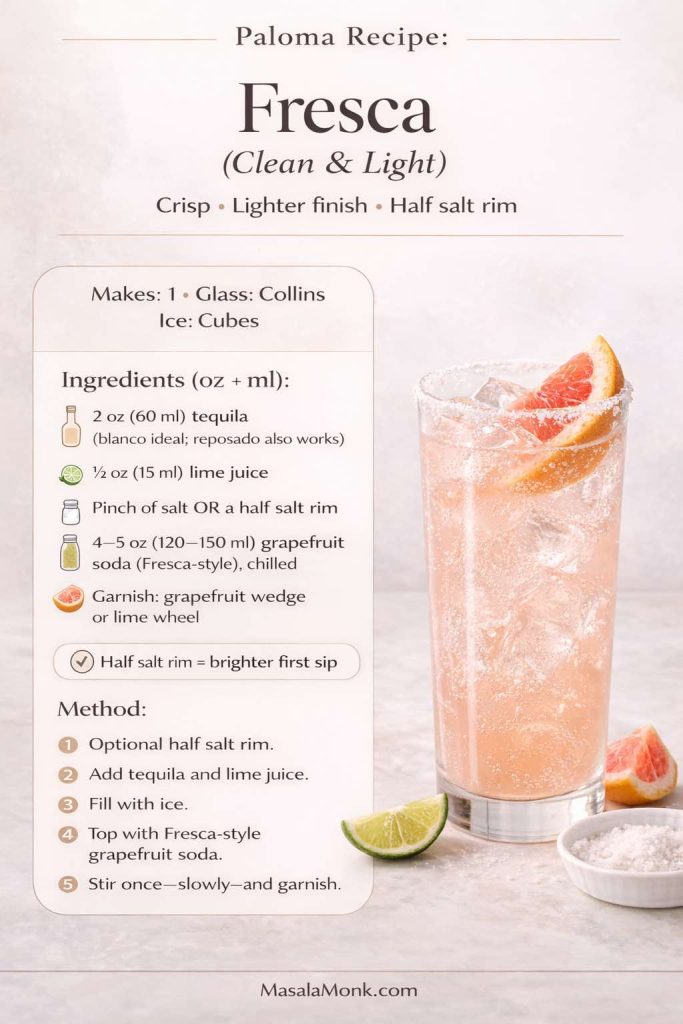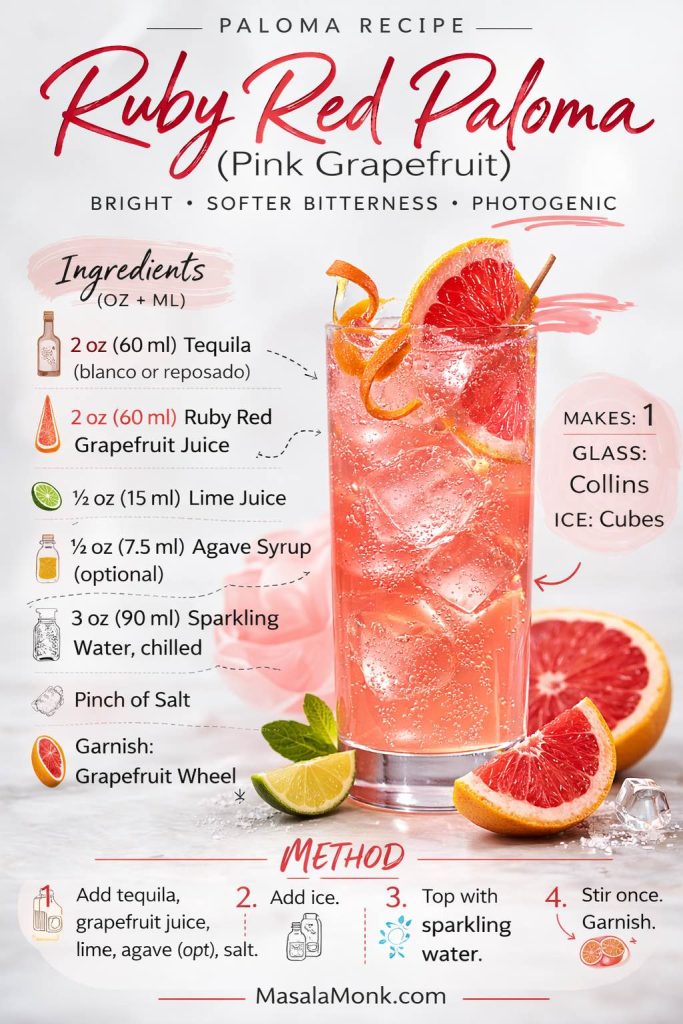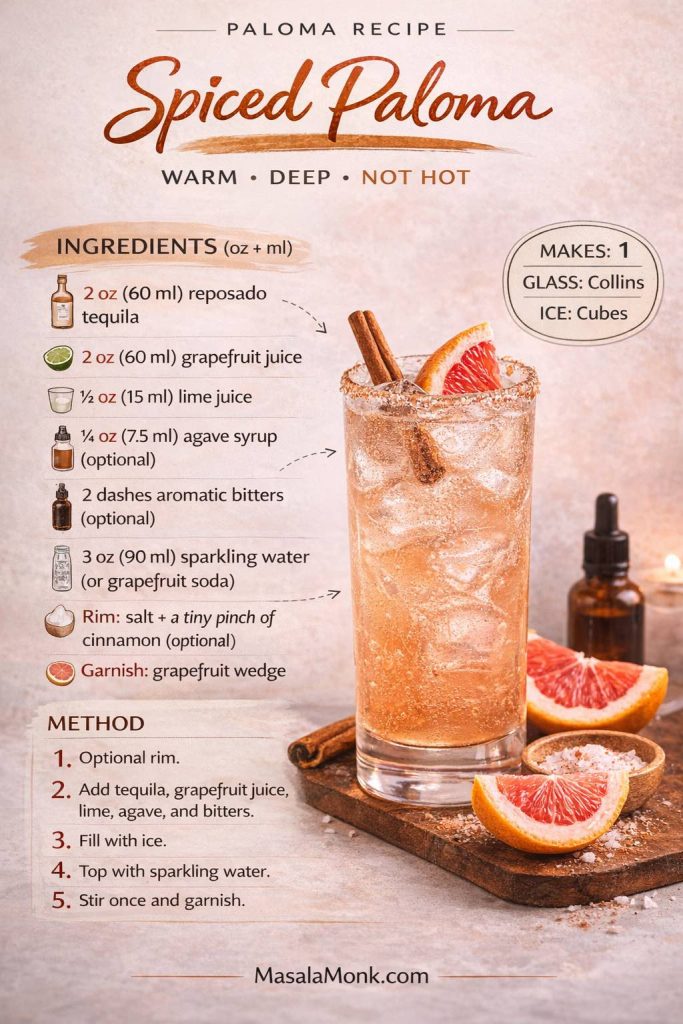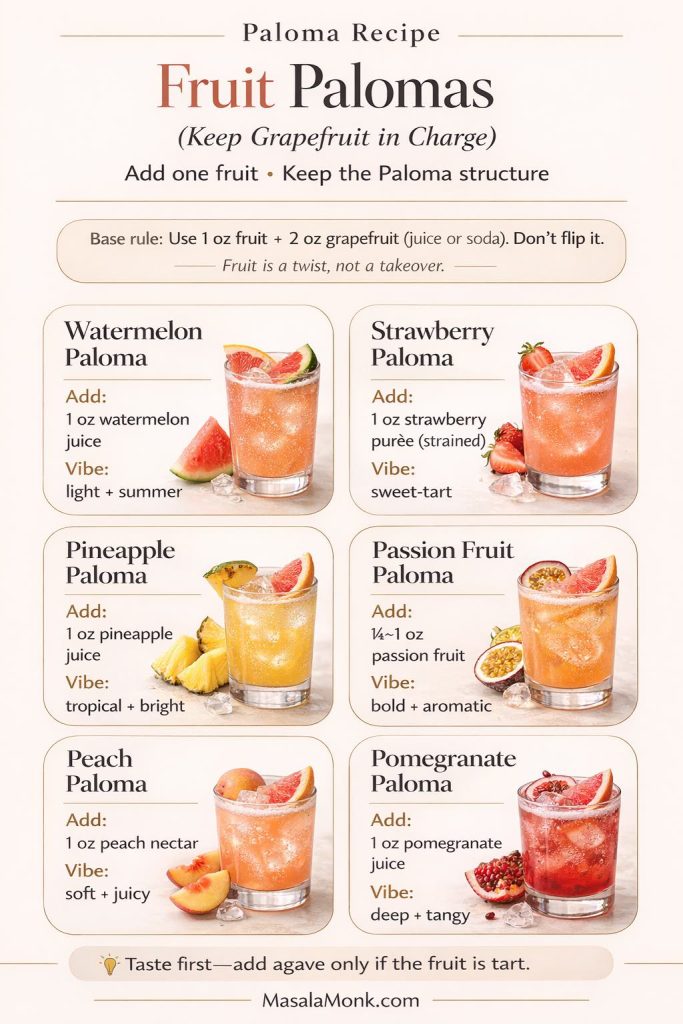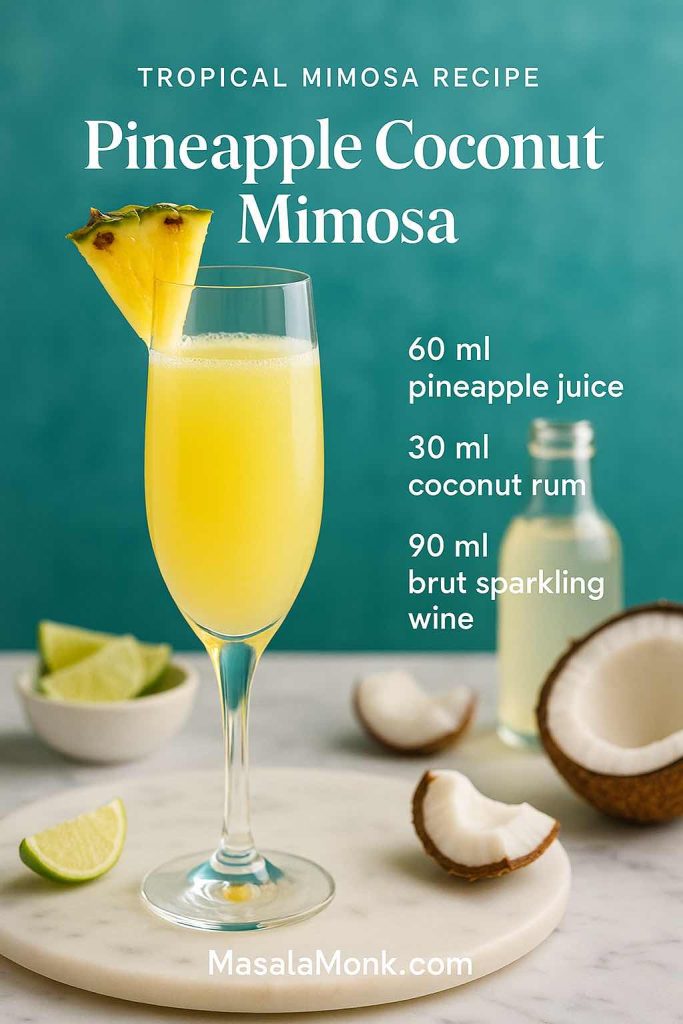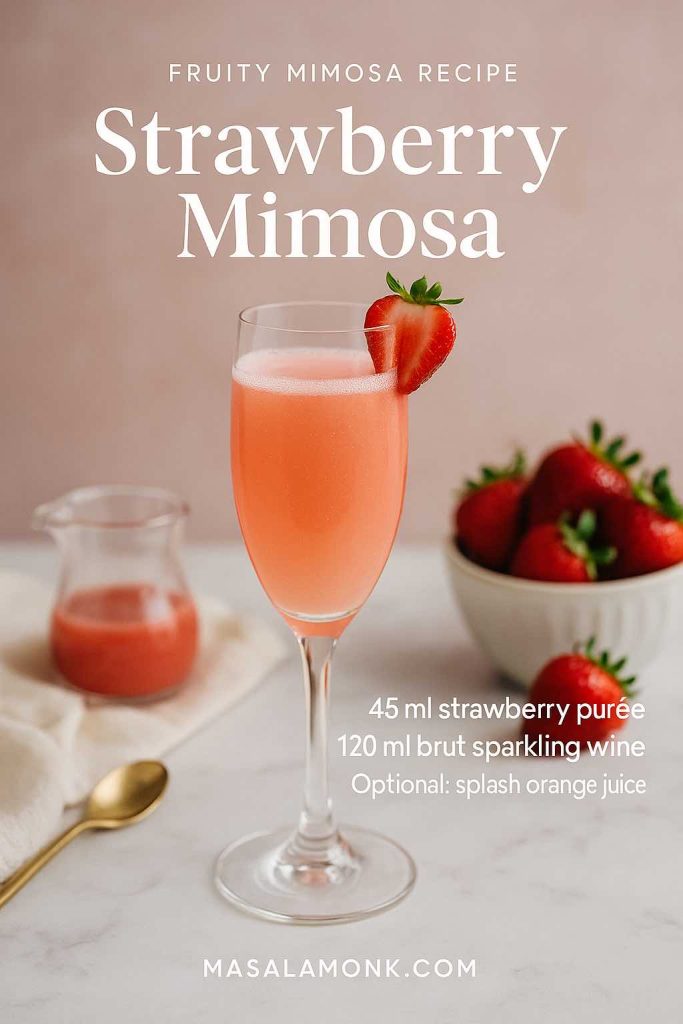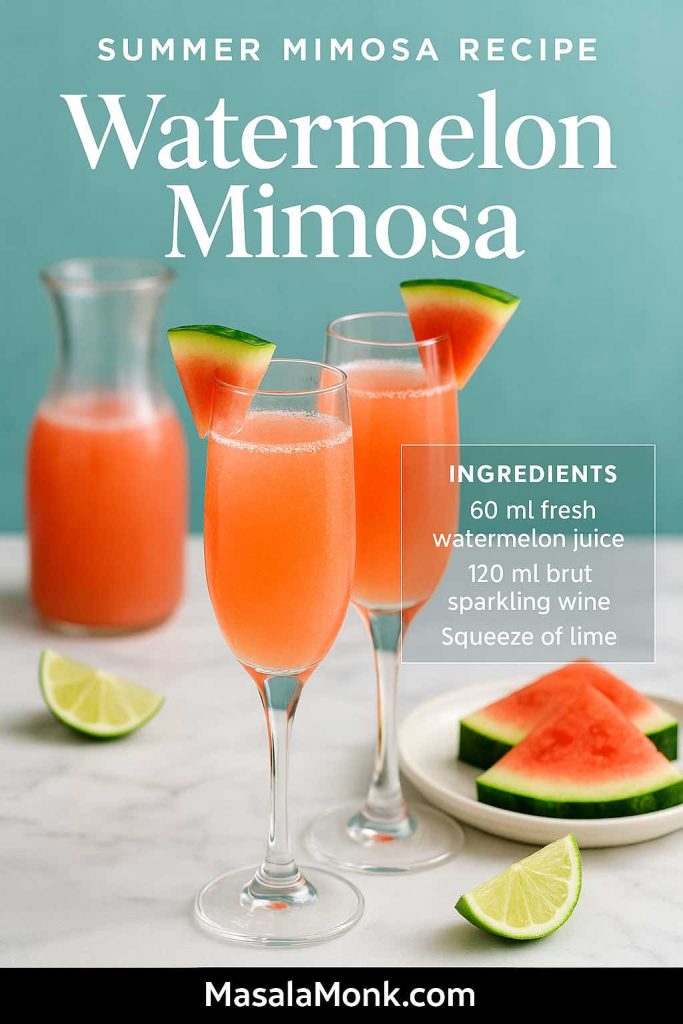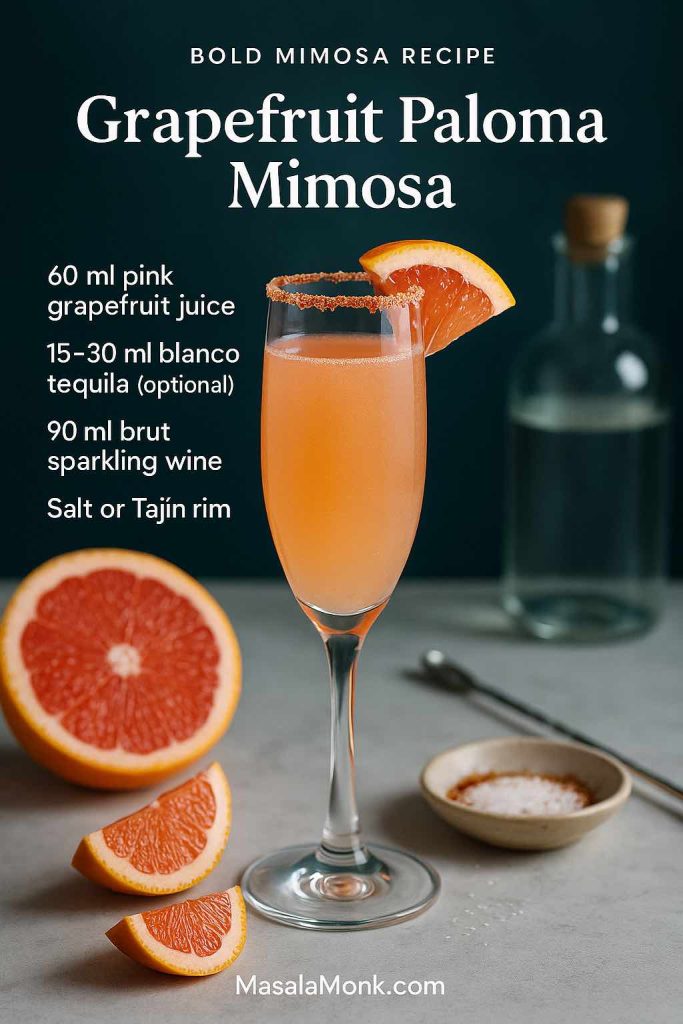
A great mojito recipe has a particular kind of clarity. The lime feels bright rather than sharp, the mint smells fresh instead of tasting bitter, and the fizz lifts everything so the drink stays light on its feet. When a mojito is made well, it doesn’t just taste “refreshing.” It tastes clean, cold, and intentional—like you meant to make it that way all along.
And yet, plenty of home mojitos miss the mark for reasons that have nothing to do with skill. Often, the sweetener wasn’t dissolved fully. Sometimes the mint was crushed like it was being punished. Other times, soda got stirred until the drink went flat. In contrast, once you understand how a classic mojito is built—order, pressure, and timing—you can make a mojito drink that tastes consistently good in any kitchen, with any glass, and with minimal tools.
Designed to be “learn it once, reuse it forever”, this guide will share:
- A proper classic mojito recipe with exact measurements
- A dependable mojito ratio you can memorize and scale
- A party-ready mojito pitcher recipe that stays fizzy
- A satisfying mojito mocktail and virgin mojito recipe that still tastes like a mojito
- Fully measured variations: strawberry mojito recipe, watermelon mojito recipe, cranberry mojito, pomegranate mojito recipe, coconut mojito recipe, pineapple mojito, peach mojito recipe, plus a few more from the flavor universe that shows up again and again (cucumber mint, blueberry, passion fruit, orange, and a fun “blue” virgin option)
Along the way, you’ll also see how to troubleshoot watery drinks, harsh lime, and bitter mint without throwing the whole glass away. Finally, you’ll get easy food pairings and a simple hosting plan, because a mojito night feels better when the table feels complete.
If you enjoy the idea of building one reliable base and then changing the finish, you’ll recognize the same logic in other crowd-friendly drinks—build the flavor core first, then finish fresh for the best texture. That’s exactly why a make-ahead drink like Rum Punch Recipe can be such a natural companion when you’re hosting: it’s a different profile, yet it rewards the same “core first, finish last” approach.
Mojito Recipe: Classic Mojito Drink (Exact Measurements, No Guessing)
The best mojito cocktail recipe is mostly technique disguised as simplicity. To begin with, you dissolve sweetness before ice. Next, you treat mint gently so it stays fragrant instead of bitter. Then you add soda at the end to protect the fizz. Finally, you stir less than you think, because over-stirring turns sparkle into flatness. Taken together, those four habits solve almost everything.
As a helpful baseline, the International Bartenders Association lists the mojito as a Contemporary Classic with a core structure of mint, lime, sugar, white rum, and soda water. You can treat that as your “north star” for what classic means, and then adjust within that framework to match your taste and your glass size. (IBA Mojito)

Classic Mojito Recipe Ingredients (1 Drink)
Makes: 1 mojito
Glass: Highball or Collins (12–14 oz / 350–415 ml is ideal)
Ice: Enough to fill the glass completely (this matters)
- Mint leaves: 8–10 leaves, plus 1 large mint sprig for garnish
- Fresh lime juice: 1 oz (30 ml)
- Simple syrup (1:1): ¾ oz (22 ml)
- or substitute 2 tsp granulated sugar (about 10 g)
- White rum: 2 oz (60 ml)
- Soda water / club soda: 2–4 oz (60–120 ml), to top
- Garnish: lime wheel or wedge + mint sprig
Why these measurements work: the lime stays bright without turning harsh, sweetness rounds the edges without becoming syrupy, rum feels present without getting sharp, and soda provides lift without washing out flavor.
How to Make a Mojito (Classic Method)
Step 1: Start by dissolving the sweetener
Add 1 oz (30 ml) lime juice and ¾ oz (22 ml) simple syrup to your glass. Stir for 10–15 seconds until the base looks uniform.
If you’re using granulated sugar instead, stir a little longer. You don’t need it to vanish completely; however, you do want most of it melted before ice goes in.

Step 2: Add mint gently—press, don’t pulverize
Add 8–10 mint leaves. Press them lightly 3–5 times with a muddler or the back of a wooden spoon. Then stop while the leaves still look intact. In other words, you’re releasing aroma—not making green debris.

Step 3: Add the rum and blend quickly
Pour in 2 oz (60 ml) white rum, then stir once or twice so it merges with the lime-sweet base. At this point, the drink should smell bright and minty already.

Step 4: Pack the glass with ice
Fill the glass all the way to the top. It feels backwards, yet more ice usually keeps the drink colder longer, which means it dilutes more slowly over the time you’re drinking it.

Step 5: Top with soda water and barely stir
Add 2–4 oz (60–120 ml) soda water. Then do one gentle lift-stir from the bottom to the top—just enough to pull that lime base upward. After that, leave it alone so the fizz stays lively.

Step 6: Garnish for aroma, not decoration
Clap your mint sprig between your palms (one firm clap is enough), then tuck it near the straw. Add a lime wheel or wedge. Now the drink smells like mint before it tastes like lime, which makes the whole thing feel fresher and more “complete.”

That’s the classic mojito drink. Make it once, then make it again. Before long, the method stops feeling like steps and starts feeling like a rhythm.
Also Read: Air Fryer Donuts Recipe (2 Ways): Glazed Homemade Donuts + Biscuit Donuts
Mojito Ratio: The Classic Mojito Formula You Can Remember
A lot of people know the ingredient list and still wonder how do you make a mojito that tastes balanced every time. The answer is a ratio you can trust.

A practical mojito ratio (lime : sweet : rum : soda)
- Lime: 1 oz (30 ml)
- Sweetener: ¾ oz (22 ml) simple syrup or 2 tsp sugar
- Rum: 2 oz (60 ml)
- Soda: top to taste (usually 2–4 oz / 60–120 ml)
In “parts,” you can think:
1 part lime : ¾ part sweet : 2 parts rum : top with soda
Once you internalize that relationship, you can make a home mojito in any glass and keep it balanced. Just as importantly, you can scale it into a mojito pitcher recipe without guessing, because you’re multiplying a pattern rather than reinventing the drink.

Why this formula works
Lime is the brightness. Sweetener is the smoothing force. Rum is the backbone. Soda is the lift. Mint, meanwhile, is the aroma that makes the drink feel like a mojito rather than a generic lime highball. If one element gets loud—too much soda, over-muddled mint, excessive syrup—the drink stops tasting crisp.
So even though the mojito is simple, it’s still a system. Treat it like a system and it becomes easy.
Also Read: Tapas Recipe With a Twist: 5 Indian-Inspired Small Plates
Mojito Ingredients (and Why Technique Matters More Than Fancy Tools)
Because mojitos use very few ingredients, each one carries more responsibility. Still, you don’t need a full bar setup. You need freshness, restraint, and timing.
Mint for mojito drink: keeping it fragrant, not bitter
Mint bitterness usually comes from over-muddling. When mint gets shredded, you extract more of the bitter, planty notes. On the other hand, gentle pressing releases aroma without turning the drink green.
Mint rule: Press lightly and stop early. Then let a strong mint sprig garnish provide aroma through every sip.

If you want the drink to smell more minty, don’t muddle harder—garnish smarter. Clap the sprig before adding it. That tiny move can make your mojito feel “bar-like” without increasing bitterness.
Lime juice: fresh vs bottled
Fresh lime juice is the cleanest way to get a bright mojito. Bottled lime can work in a pinch, especially for a party base, but it often tastes slightly muted. If you use bottled, compensate by keeping everything colder and leaning on fresh lime garnish and strong mint aroma.
White rum for mojitos: what “white” really means
White rum isn’t one flavor. It’s a style. For a classic mojito recipe, you want rum that reads clean rather than oaky, so lime and mint stay in the spotlight. Lightly aged rum can be delicious too, but it shifts the drink warmer and richer.

If you’ve ever thought, “white rum for mojitos—what should I use?” the most practical answer is: use a clean white rum you enjoy in simple drinks. The mojito doesn’t hide rum; it frames it.
Soda water: protecting the fizz
Soda is fragile. Warm soda goes flat faster. Aggressive stirring knocks out bubbles. Accordingly, keep soda cold, add it last, and stir gently once. That’s the fizz insurance policy.
Also Read: Air Fryer Salmon Recipe (Time, Temp, and Tips for Perfect Fillets)
How to Make a Mojito Cocktail That Stays Crisp (Not Watery)
Watery mojitos don’t happen because someone lacks talent. They happen because the drink warms quickly and melts quickly.

The ice strategy (simple, but decisive)
A glass that’s half ice warms faster. A glass that’s full of ice stays cold. As a result, it melts more slowly over the time you’re drinking. Counterintuitively, more ice often means less dilution over time.
The soda strategy (timing is everything)
If you add soda and then stir a lot, you flatten the drink and accelerate dilution. Instead, add soda at the end and stir minimally. One lift-stir is usually enough.
The mint strategy (avoid the “green” taste)
Mint should smell like mint. It shouldn’t taste like bruised salad. Gentle pressing keeps the flavor clean. A fragrant garnish does the rest.
Also Read: Masterclass in Chai: How to Make the Perfect Masala Chai (Recipe)
Mojito Mistakes + Fixes (So You Can Rescue the Glass)
Even with a good mojito recipe, a drink can drift. Fortunately, mojitos are forgiving if you know which lever to pull.

Watery mojito: what happened and how to fix it
Common causes: not enough ice, too much soda, soda stirred too much, or the drink sat warm.
Fix in the glass:
Add more ice. Then add ½ oz (15 ml) rum and a small splash of soda. Stir once. If it still tastes thin, add a quick squeeze of lime (start with about ¼ oz / 7 ml).
Prevent next time:
Fill the glass with ice and keep soda as the final step.
Mojito too sour: how to rebalance
Some limes are sharper than others.
Fix: add ¼ oz (7 ml) simple syrup, stir gently, taste again. Repeat once if needed. Sweetness rounds acidity faster than adding more rum.
Mojito too sweet: how to rebalance
Too sweet often comes from heavy syrup or fruit additions.
Fix: add ½ oz (15 ml) lime juice (or a generous squeeze), then refresh fizz with soda water.
Bitter mint: how to prevent it completely
If mint tastes bitter, it’s usually overworked.
Fix now: stretch the drink with more ice and a small splash more soda to soften bitterness.
Fix next time: fewer muddle presses, gentler pressure, stronger garnish sprig.
Also Read: Crock Pot Pork Chops and Sauerkraut (No Dry Chops Recipe)
Simple Syrup for Mojitos (and Why It Makes Everything Easier)
If you make mojitos even semi-regularly, simple syrup is the upgrade that makes the whole process smoother. It dissolves instantly, which means you don’t have to over-stir and destroy fizz just to avoid gritty sugar.
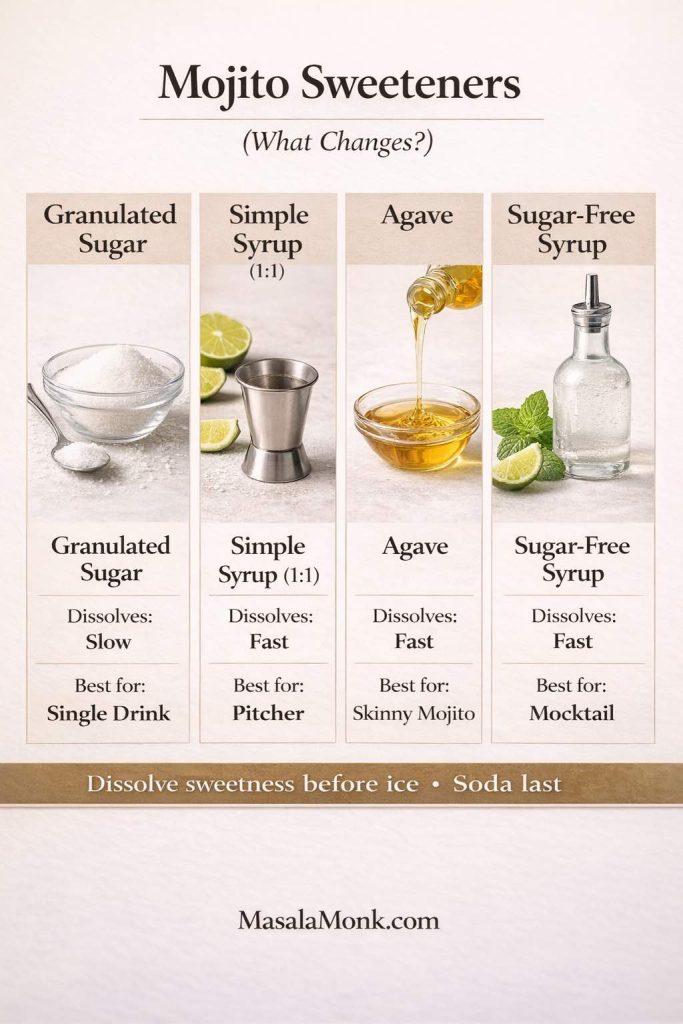
1:1 simple syrup recipe (makes about 1 cup / 240 ml)
- 1 cup (200 g) granulated sugar
- 1 cup (240 ml) water
Stovetop method: Warm gently in a small saucepan, stirring until fully dissolved. Cool completely, then refrigerate.
No-stove method: Combine sugar and warm water in a jar and shake until dissolved.
Once you have syrup, a mojito recipe easy version becomes genuinely easy: lime + syrup, gentle mint press, rum, ice, soda, garnish.
Also Read: Keto Mocktails: 10 Low Carb, Sugar Free Recipes
Mojito Mix: A Shortcut That Still Tastes Fresh (Homemade, Not Bottled)
“Mojito mix” often means a store-bought bottle that’s sweet-heavy and mint-light. It can be convenient, but it rarely tastes as crisp as fresh lime and mint. However, you can make a homemade mix-style base that’s actually useful for hosting.

Mojito mix recipe (homemade lime-syrup base)
Makes: about 1¾ cups (enough for 10–12 drinks)
- Fresh lime juice: 1 cup (240 ml)
- Simple syrup: ¾ cup (180 ml)
Whisk together and chill. Then, for each mojito:
- Use 1 oz (30 ml) of this base
- Add mint, rum (or omit for mocktail), ice, soda, garnish
This doesn’t replace the mojito method—it simply speeds up the measuring so you can pour drinks faster without sacrificing brightness.
Also Read: Slow Cooker Pork Tenderloin (Crock Pot Recipe) — 3 Easy Ways
Mojito Pitcher Recipe (Batch Mojitos Without Flat Drinks)
A pitcher of mojitos sounds like the ultimate party move—right up until you remember the fizz problem: soda in a pitcher goes flat quickly. Meanwhile, mint left to sit too long can drift from fresh and fragrant into grassy and dull. Because of that, the best pitcher plan comes down to one simple rule:
Make a chilled base. Top each glass with soda at serving time.

In other words, you build flavor ahead, then you finish with sparkle at the last moment. That single switch is the difference between bright and lively and flat mint lemonade.
Best Mojito Pitcher Recipe (Serves 8)
Pitcher base (make ahead):
- Fresh lime juice: 8 oz (240 ml)
- Simple syrup (1:1): 6 oz (180 ml)
- White rum: 16 oz (480 ml)
- Mint leaves: 30–40 leaves (about 1 packed cup, loosely)
To serve (finish fresh):
- Soda water: 24–32 oz (720–960 ml), kept cold and unopened
- Ice: plenty
- Garnish: mint sprigs + lime wheels
How to Make a Pitcher of Mojitos (Step-by-Step Recipe)
Step 1: Stir lime and syrup first
In a pitcher, combine 8 oz (240 ml) lime juice and 6 oz (180 ml) simple syrup. Then stir until the mixture looks completely blended. This matters because an evenly mixed base pours consistently into every glass—so your first mojito and your last mojito taste the same.

Step 2: Add mint and press gently
Next, add 30–40 mint leaves. Using a spoon (or muddler), press the leaves lightly a few times—just enough to release aroma. Then stop while the mint still looks intact. You’re aiming for fragrance, not green foam, and you want the base to stay bright rather than turning “leafy.”

Step 3: Add rum and chill hard
Now pour in 16 oz (480 ml) white rum. Give the pitcher one quick stir, then refrigerate until very cold. The colder the base, the better it behaves at serving time—less melt, better balance, and a cleaner finish.

Step 4: Serve over ice and top with soda per glass
When you’re ready to serve, fill each glass with ice. Pour 3–4 oz (90–120 ml) of the chilled mojito base into the glass. After that, top with cold soda water, then give it one gentle stir—just enough to combine without flattening the drink. Finally, garnish with a mint sprig and a lime wheel so each glass smells fresh as soon as it’s picked up.

This “base now, fizz later” approach is the same logic that makes make-ahead party drinks work so well. If you’re building a bigger drink table and want a second crowd drink you can prep in advance, Rum Punch Recipe fits perfectly alongside pitcher mojitos because it follows that same “core first” philosophy.
Make-ahead timing (to keep it fresh)
- Mix lime + syrup + rum earlier in the day and refrigerate.
- Add mint closer to serving, or add it earlier but remove leaves after 20–30 minutes if you’re holding a long time.
- Keep soda sealed until the last moment.

That way, your pitcher tastes bright rather than dull, and each glass gets real fizz.
Also Read: Chicken Pesto Pasta (Easy Base Recipe + Creamy, One-Pot, Baked & More)
Mojito Mocktail and Virgin Mojito Recipe (Alcohol-Free, Still Satisfying)
A virgin mojito recipe works best when it doesn’t try to replace rum with extra sugar. Instead, it leans into what makes mojitos great in the first place: lime brightness, mint aroma, and sparkling lift.

Virgin mojito recipe (1 drink)
- Mint leaves: 8–10 leaves + garnish sprig
- Fresh lime juice: 1 oz (30 ml)
- Simple syrup: ¾ oz (22 ml) or 2 tsp sugar
- Soda water: 4–6 oz (120–180 ml)
- Ice: fill the glass
- Garnish: mint sprig + lime
Method: Stir lime + syrup, press mint gently, add ice, top with soda, stir once, garnish.
If you’re putting together a drinks table where not everyone wants alcohol, it’s useful to have more than one alcohol-free option so nobody feels stuck with “the one mocktail.” That’s why Keto Mocktails is such a natural companion for a mojito night: it gives you a whole set of alternatives while keeping the same “fresh and festive” feeling.
Virgin mojito pitcher (serves 8)
- Fresh lime juice: 8 oz (240 ml)
- Simple syrup: 6 oz (180 ml)
- Mint leaves: 30–40 leaves
- Soda water: 40–48 oz (1.2–1.4 L), topped per glass
- Ice + garnish: plenty
Build and chill the base, then top each glass with soda right before serving.
A few mocktail-friendly flavor directions
If you want your mojito mocktail to feel more “crafted,” introduce one flavor note while keeping lime and mint obvious:
- Cucumber mint mojito mocktail (cool and crisp)
- Blueberry mojito mocktail (soft berry with bright lime)
- Passion fruit mojito mocktail (tropical tang)
- Elderflower mojito mocktail (floral lift)
You’ll find measured versions below, so you can make them without turning your drink into syrupy fruit soda.
Mojito Variations (Measured, Balanced, Still a Mojito)
Fruit mojitos are where people get excited and where drinks sometimes become sugar bombs. The key is simple: fruit should complement the base, not replace it. Lime and mint should still read clearly. Soda should still provide lift. Rum should still feel present but not harsh.
Below are measured variations built on the classic framework. Each one starts with the same base logic: dissolve sweetness, treat mint gently, pack ice high, add soda last, stir minimally.

Strawberry mojito recipe (1 drink)
- Strawberries: 2 medium strawberries, sliced (or 1 oz / 30 ml puree)
- Mint leaves: 8–10
- Fresh lime juice: 1 oz (30 ml)
- Simple syrup: ½–¾ oz (15–22 ml)
- White rum: 2 oz (60 ml)
- Soda water: 2–4 oz (60–120 ml)
- Ice + garnish: mint sprig + strawberry slice (optional)

Method:
Stir lime + syrup first. Add strawberries and press lightly once or twice. Then add mint and press gently (3–4 light presses). Add rum, fill with ice, top with soda, stir once.
This approach keeps the strawberry flavor fresh rather than jammy, while the drink still tastes like a mojito first.
Watermelon mojito recipe (1 drink)
- Watermelon juice/puree: 2 oz (60 ml)
- Mint leaves: 8–10
- Lime juice: 1 oz (30 ml)
- Simple syrup: ½ oz (15 ml)
- White rum: 2 oz (60 ml)
- Soda water: 2–3 oz (60–90 ml)
- Ice + garnish: mint sprig + lime wheel

Method:
Stir lime + syrup + watermelon. Add mint gently. Add rum. Pack with ice. Top with soda. Stir once.
Watermelon is mostly water, so it dilutes easily. That’s why the soda range is slightly smaller here: you want sparkle without turning the drink thin.
If you’re offering a second summer drink that feels different without leaving the “bright and fun” lane, Watermelon Margarita Variations can be a natural addition to the table.
Cranberry mojito recipe (1 drink)
- Cranberry juice: 1 oz (30 ml)
- Mint leaves: 8–10
- Lime juice: 1 oz (30 ml)
- Simple syrup: ¾ oz (22 ml)
- White rum: 2 oz (60 ml)
- Soda water: 2–4 oz (60–120 ml)
- Ice + garnish: mint sprig + lime wheel

Method:
Stir lime + syrup + cranberry first. Add mint gently. Add rum. Ice. Soda. Minimal stir.
Cranberry is tart, so it benefits from the full syrup amount. If you like that sharp, fizzy direction, Cranberry Moscow Mule Recipe is another internal drink that keeps the “cold and crisp” feel while switching flavor families.
Pomegranate mojito recipe (1 drink)
- Pomegranate juice: 1 oz (30 ml)
- Mint leaves: 8–10
- Lime juice: 1 oz (30 ml)
- Simple syrup: ¾ oz (22 ml)
- White rum: 2 oz (60 ml)
- Soda water: 2–4 oz (60–120 ml)
- Ice + garnish: mint sprig + lime wheel

Method:
Stir lime + syrup + pomegranate. Add mint gently. Add rum. Ice. Soda. One lift-stir.
Pomegranate adds a deeper fruit tang, so the drink feels a little more “evening” than “afternoon.” For a virgin pomegranate mojito, simply omit rum and top with extra soda.
Coconut mojito recipe (1 drink)
- Coconut water: 2 oz (60 ml) (or coconut-flavored sparkling water)
- Mint leaves: 8–10
- Lime juice: 1 oz (30 ml)
- Simple syrup: ½ oz (15 ml)
- White rum: 2 oz (60 ml)
- Soda water: 2–3 oz (60–90 ml)
- Ice + garnish: mint sprig + lime wheel

Method:
Stir lime + syrup + coconut water. Add mint gently. Add rum. Ice. Soda. Minimal stir.
Coconut can feel creamy or sweet quickly. Keeping lime loud and syrup restrained keeps the drink crisp rather than dessert-like. If you want more tropical hosting ideas beyond mojitos, Coconut Water Cocktails fits naturally as a “next read.”
Pineapple mojito (1 drink)
- Pineapple juice: 1½ oz (45 ml)
- Mint leaves: 8–10
- Lime juice: 1 oz (30 ml)
- Simple syrup: ½ oz (15 ml)
- White rum: 2 oz (60 ml)
- Soda water: 2–3 oz (60–90 ml)
- Ice + garnish: mint sprig + pineapple wedge (optional)

Method:
Stir lime + syrup + pineapple. Add mint gently. Add rum. Ice. Soda. One lift-stir.
Because pineapple is naturally sweet, the syrup is intentionally lighter. If you’re serving non-alcoholic guests too, Pineapple Mojito Mocktail Recipes makes a great internal companion.
Peach mojito recipe (1 drink)
- Peach slices: 2–3 slices (or peach puree 1 oz / 30 ml)
- Mint leaves: 8–10
- Lime juice: 1 oz (30 ml)
- Simple syrup: ¾ oz (22 ml)
- White rum: 2 oz (60 ml)
- Soda water: 2–4 oz (60–120 ml)
- Ice + garnish: mint sprig + peach slice (optional)

Method:
Stir lime + syrup first. Add peach and press lightly once or twice. Add mint gently. And then add rum. Ice. Soda. Minimal stir.
Peach is gentle, so lime brightness is what keeps it refreshing rather than perfumey. If you want a “frozen peach mojito,” blend peach slices with ice first, then build a lighter version with a small splash of soda at the end.
Also Read: Crock Pot Chicken Breast Recipes: 10 Easy Slow Cooker Dinners (Juicy Every Time)
More Mojito Methods (So Variations Stay Clean)
At this point, you have multiple recipes. Now let’s make sure they all taste sharp and fresh.
Method 1: The “gentle press” mint method (best for clean flavor)
- Stir lime + syrup first
- Add mint
- Press lightly 3–5 times
- Stop early
- Garnish strongly
This method keeps the drink crisp and prevents bitterness.

Method 2: The “fruit-first” method (best for strawberry, peach, blueberry)
- Stir lime + syrup
- Add fruit
- Press fruit lightly just to release juice
- Add mint after fruit
- Press mint gently (less than you think)
- Continue with rum, ice, soda
Putting fruit before mint reduces the temptation to smash everything together, which keeps mint cleaner.

Method 3: The “batch base” method (best for a pitcher of mojitos)
- Build lime + syrup + rum base
- Chill hard
- Add mint briefly, then remove if holding long
- Top with soda per glass

This protects fizz and keeps mint tasting fresh.
Also Read: Eggless Yorkshire Pudding (No Milk) Recipe
Cucumber Mint Mojito (and Cucumber Mojito Mocktail)
Cucumber is a quiet ingredient, which makes it perfect for drinks that should feel crisp rather than sweet. It also pairs beautifully with mint and lime.
Cucumber mint mojito recipe (1 drink)
- Cucumber: 3–4 thin slices
- Mint leaves: 8–10
- Lime juice: 1 oz (30 ml)
- Simple syrup: ¾ oz (22 ml)
- White rum: 2 oz (60 ml)
- Soda water: 2–4 oz (60–120 ml)
- Ice + garnish (mint sprig + cucumber ribbon if you want)

Method:
Stir lime + syrup. Add cucumber and press lightly once or twice to release freshness. Add mint and press gently. And then add rum, ice, soda, giveit minimal stir.
Cucumber mojito mocktail (1 drink)
Use the same recipe, but omit rum and increase soda to 4–6 oz (120–180 ml). The result is a cucumber mint mojito mocktail that tastes clean and grown-up, especially when served very cold.
Also Read: Garlic & Paprika Cabbage Rolls (Keto-Friendly Recipes) – 5 Bold Savory Twists
Blueberry Mojito Mocktail (and a Light Blueberry Mojito)
Blueberries bring a soft fruit sweetness that can become heavy if you overdo it. For that reason, the best blueberry mojito direction is measured and bright, with lime leading.
Blueberry mojito mocktail recipe (1 drink)
- Blueberries: 10–12 berries
- Mint leaves: 8–10
- Lime juice: 1 oz (30 ml)
- Simple syrup: ½–¾ oz (15–22 ml)
- Soda water: 4–6 oz (120–180 ml)
- Ice + garnish

Method:
Stir lime + syrup. Add blueberries and press lightly (just enough to crack a few berries). Add mint and press gently. Ice. Soda. Minimal stir.
Blueberry mojito (with rum)
Add 2 oz (60 ml) white rum and reduce soda to 2–4 oz (60–120 ml). Keep it bright, not jammy.
Also Read: 10 Low Carb Chia Pudding Recipes for Weight Loss (Keto, High-Protein, Dairy-Free)
Passion Fruit Virgin Mojito (and Passion Fruit Mojito Mocktail)
Passion fruit tastes bold and tangy, so it plays beautifully with lime. Nevertheless, it can overpower mint if you use too much. The fix is easy: keep passion fruit measured and let mint be the aroma rather than the main flavor.
Passion fruit virgin mojito recipe (1 drink)
- Passion fruit puree: 1 oz (30 ml)
- Mint leaves: 8–10
- Lime juice: ¾–1 oz (22–30 ml)
- Simple syrup: ½ oz (15 ml)
- Soda water: 4–6 oz (120–180 ml)
- Ice + garnish

Method:
Stir lime + syrup + passion fruit first. Then add mint gently. Ice. Soda. Minimal stir.
If you prefer it boozier, add 2 oz rum and reduce soda to 2–3 oz.
Also Read: Keto Hot Chocolate Recipe (Sugar-Free Hot Cocoa) + Best Homemade Mix
Orange Virgin Mojito (Bright, Simple, Crowd-Friendly)
Orange is softer than lime, so an orange virgin mojito should still include lime for structure. Otherwise, it tastes like orange soda with mint.
Orange virgin mojito (Recipe for 1 drink)
- Fresh orange juice: 1½ oz (45 ml)
- Lime juice: ¾ oz (22 ml)
- Mint leaves: 8–10
- Simple syrup: ½ oz (15 ml)
- Soda water: 4–6 oz (120–180 ml)
- Ice + garnish

Method:
Stir juices + syrup. Then add mint gently. Ice. Soda. Minimal stir.
This one is especially good for daytime gatherings because it feels sunny without being sugary.
Also Read: Dirty Martini Recipe (Classic, Extra Dirty, No Vermouth, Spicy, Blue Cheese, Tequila + Batched)
Virgin Blue Mojito Recipe (Fun Color, Same Mojito Logic)
A “blue mojito” is usually about color, not tradition. Even so, it can still be built like a proper mojito so it tastes clean rather than artificial.
Virgin blue mojito (Recipe for 1 drink)
- Blue syrup (non-alcoholic): ½ oz (15 ml)
- Lime juice: 1 oz (30 ml)
- Mint leaves: 8–10
- Soda water: 4–6 oz (120–180 ml)
- Ice + garnish

Method:
Stir lime + blue syrup first. Add mint gently. Ice. Soda. Minimal stir.
If the syrup is very sweet, reduce it slightly and keep lime full-strength. That keeps the drink crisp.
Also Read: Fish and Chips Reimagined: 5 Indian Twists (Recipe + Method)
Classic Mojito Cocktail, Bar-Style (Same Ingredients, Cleaner Recipe)
Sometimes you want a classic mojito cocktail that feels tighter—less casual, more “this tastes like it came from a bar.” The ingredients don’t change. The technique does.

Here’s the bar-clean approach:
- dissolve sweetness thoroughly before mint
- press mint lightly and briefly
- pack ice high
- add soda last
- stir once, then stop
- garnish aggressively for aroma
It’s not complicated; it’s controlled. And once you do it this way a few times, it becomes your default method because it’s hard to go back to muddled chaos.
Also Read: Ravioli Recipe Reinvented: 5 Indian-Inspired Twists on the Italian Classic
Cuban Mojito Recipe Notes (Mojito Cubano, Traditional Cuban Mojito)
You’ll see terms like cuban mojito recipe, mojito cubano recipe, and authentic cuban mojito recipe. In practice, the “traditional” vibe is mostly about keeping things straightforward—mint, lime, sugar, rum, soda—with a simple build.
If you want a Cuban-leaning feel, the easiest change is using granulated sugar rather than syrup:
- Swap ¾ oz (22 ml) syrup for 2 tsp sugar
- Stir longer at the beginning to dissolve
- Keep everything else the same
That yields a drink that feels classic without adding fuss.
Also Read: Croquettes Recipe: One Master Method + 10 Popular Variations
What to Serve With Mojitos (Food Pairings That Make the Drink Pop)
A mojito shines next to salty, crispy, spicy food because that lime-mint sip resets your palate between bites. Meanwhile, very heavy creamy dishes can sometimes make the drink feel sharper than you want. So, when in doubt, go for snacks and finger foods.
Crispy party pairings
If you want one pairing that almost always works, it’s wings—especially when you want a drink that cuts through salty, saucy bites.
Cheesy crowd-pleasers
Lime cuts richness. Mint keeps the finish light. That’s why cheesy finger foods pair surprisingly well with mojitos.
Bite-size appetizer spreads
Croquettes give you that “party platter” feeling with minimal fuss, and they pair beautifully with bright drinks.
Quick “pick one” appetizer ideas
If you want options rather than a plan, a roundup makes the snack table easy.
A Brief, Clear Note on Strength (Comfortable Pacing)
Servings can vary because pours vary. Still, it can be helpful to understand what a “standard drink” means when you’re measuring spirits. In the U.S., a standard drink contains 0.6 ounces (14 grams) of pure alcohol, and the actual serving size depends on ABV. (CDC)
That’s not here to interrupt the fun. Rather, it’s simply useful context when you’re hosting or when you want to keep servings consistent.
Also Read: How to Make a Flax Egg (Recipe & Ratio for Vegan Baking)
A Mojito Night Plan That Feels Effortless (Not Like You’re Bartending All Night)
If you’re making one drink, the classic method is quick. If you’re serving a group, a small setup makes everything smoother.

For 2–4 people
- Make simple syrup (or use sugar and stir well)
- Chill rum and soda
- Prep garnishes: mint sprigs + lime wheels
- Offer two options: classic mojito + one fruit variation (strawberry or watermelon)
This keeps the vibe generous without turning you into a full-time bartender.
For a crowd
- Make the chilled pitcher base (lime + syrup + rum)
- Keep soda sealed and cold
- Serve over ice and top with soda per glass
- Garnish each glass with mint at the last second
If you want a second crowd drink that feels completely different yet still party-friendly, Rum Punch Recipe is a natural companion because it’s easy to prep ahead and serve smoothly.
Also Read: Pork Tenderloin in Oven (Juicy, Easy, 350°F or 400°F) Recipe
More Drinks to Keep the Table Interesting (Same Refreshing Energy)
Once someone likes mojitos, they often enjoy other bright, fizzy drinks too. So if you want a few natural “next drinks” on your site that fit the same hosting mood, these are easy internal hops:
They each bring a different personality—gingery, sparkling, citrusy, sharp—while still feeling like they belong at the same table as a mojito.
Also Read: 19 Essential Kitchen Tools That Make Cooking Easier
Bringing It All Together
A mojito doesn’t need to be complicated to be excellent. It just needs a few decisions made with care: dissolve sweetness early, treat mint gently, use plenty of ice, add soda last, and stir lightly. Once you do that, your mojito recipe becomes reliable—whether you’re making one classic mojito drink for yourself, scaling a mojito pitcher recipe for guests, building a virgin mojito recipe for an alcohol-free option, or rotating through variations like strawberry, watermelon, cranberry, pomegranate, coconut, pineapple, peach, cucumber mint, blueberry, passion fruit, orange, and a fun “blue” virgin version.
After a few rounds, the mojito stops being “a recipe you follow” and starts becoming something you can make on instinct. And when that happens, mojitos stop being occasional. They start becoming a favorite you can pull off anytime—quiet evening, hot afternoon, or crowded table.
Also Read: How to Cook Tortellini (Fresh, Frozen, Dried) + Easy Dinner Ideas
FAQs about Mojito Recipe
1) What is the best mojito recipe for beginners?
If you’re starting out, the best mojito recipe is the classic build: dissolve lime and sweetener first, press mint gently (don’t crush it), add rum, pack the glass with ice, then finish with soda water. That order keeps the drink crisp, prevents bitter mint, and protects the fizz.
2) How do you make a mojito that doesn’t taste watery?
Most watery mojitos come from too little ice or too much soda. Instead, fill the glass completely with ice, add soda last, and stir only once. If the drink still tastes thin, reduce soda slightly and keep the lime and rum at full strength.
3) What is the classic mojito ratio?
A reliable classic mojito ratio is: 1 oz lime juice, 3/4 oz simple syrup (or 2 tsp sugar), 2 oz white rum, then top with soda water. After that, adjust soda to taste rather than changing the core ratio.
4) How much mint should I use for a mojito drink?
Typically, 8–10 mint leaves are enough for a minty aroma without bitterness, especially when you garnish with a fresh mint sprig. If you want more mint impact, add more garnish rather than muddling harder.
5) Why does my mint mojito recipe taste bitter?
Usually, the mint was over-muddled or stirred too aggressively after bruising. To avoid that, press mint lightly a few times, then stop. Also, add soda at the end and stir minimally so the mint doesn’t get churned through the drink.
6) Can I make a mojito without a muddler?
Yes. You can use the back of a wooden spoon or the handle end of a rolling pin. The key is gentle pressure—think “press to release aroma,” not “smash to extract juice.”
7) Can I use bottled lime juice in a mojito recipe at home?
You can, particularly for batching a pitcher base, although fresh lime tastes brighter. If you use bottled lime juice, keep the drink extra cold and use a fresh lime garnish so the aroma stays lively.
8) What’s the best white rum for mojitos?
For a classic mojito drink, choose a clean, light white rum that doesn’t taste overly oaky or spiced. Since the mojito is a delicate cocktail, smoother rums tend to let the lime and mint shine.
9) How strong is a mojito cocktail?
A standard mojito is typically built with around 2 oz rum, then diluted with ice melt and topped with soda. As a result, the strength depends on how much soda you add and how long the drink sits, but it usually drinks lighter than straight spirits.
10) How do I make a mojito pitcher recipe that stays fizzy?
Instead of adding soda to the pitcher, make a chilled base (lime + syrup + rum + mint briefly), then top each glass with soda at serving time. That way, every mojito stays sparkling and doesn’t go flat in the pitcher.
11) Can I make mojitos ahead of time?
Yes—partially. You can prep the mojito base (lime juice, sweetener, rum) and chill it. However, for the best taste, add mint shortly before serving and add soda only when pouring each glass.
12) What is a mojito mocktail and how do you make it taste like the real thing?
A mojito mocktail (or virgin mojito) uses the same structure—lime, sweetener, mint, ice, soda—just without rum. To keep it “cocktail-like,” focus on balance and aroma: dissolve the sweetener fully, press mint gently, and garnish generously.
13) How do you make a virgin mojito recipe for a crowd?
Make a chilled pitcher base using lime juice and simple syrup, add mint briefly for aroma, then pour over ice and top each glass with soda water. This approach keeps the mocktail fresh and fizzy for guests.
14) What’s the difference between a Cuban mojito recipe and a regular mojito?
A Cuban mojito recipe is usually very close to the classic build, often using granulated sugar rather than syrup and keeping the method simple. Even so, the same principles apply: gentle mint, bright lime, and soda added at the end.
15) How do I make a strawberry mojito recipe without it tasting like fruit soda?
Use a small amount of fresh strawberry (or puree), keep lime prominent, and don’t over-sweeten. Then build the drink like a classic mojito—mint gently pressed, ice packed, soda added last—so it still tastes like a mojito first.
16) What’s the best method for a watermelon mojito recipe?
Because watermelon is mostly water, use measured watermelon juice/puree, keep lime at full strength, and use slightly less soda than usual. That prevents the drink from turning thin while still staying sparkling.
17) Can I make a cranberry mojito or pomegranate mojito that isn’t too tart?
Yes. Start with the classic mojito ratio, then add cranberry or pomegranate juice in a controlled amount. Afterward, adjust with a small splash of syrup if needed, and finish with soda to keep it light.
18) What should I serve with mojitos?
Mojitos pair well with salty, crispy, and spicy foods because lime and mint refresh your palate. For example, wings, fries, croquettes, or cheesy finger foods all work well alongside a classic mojito cocktail.



